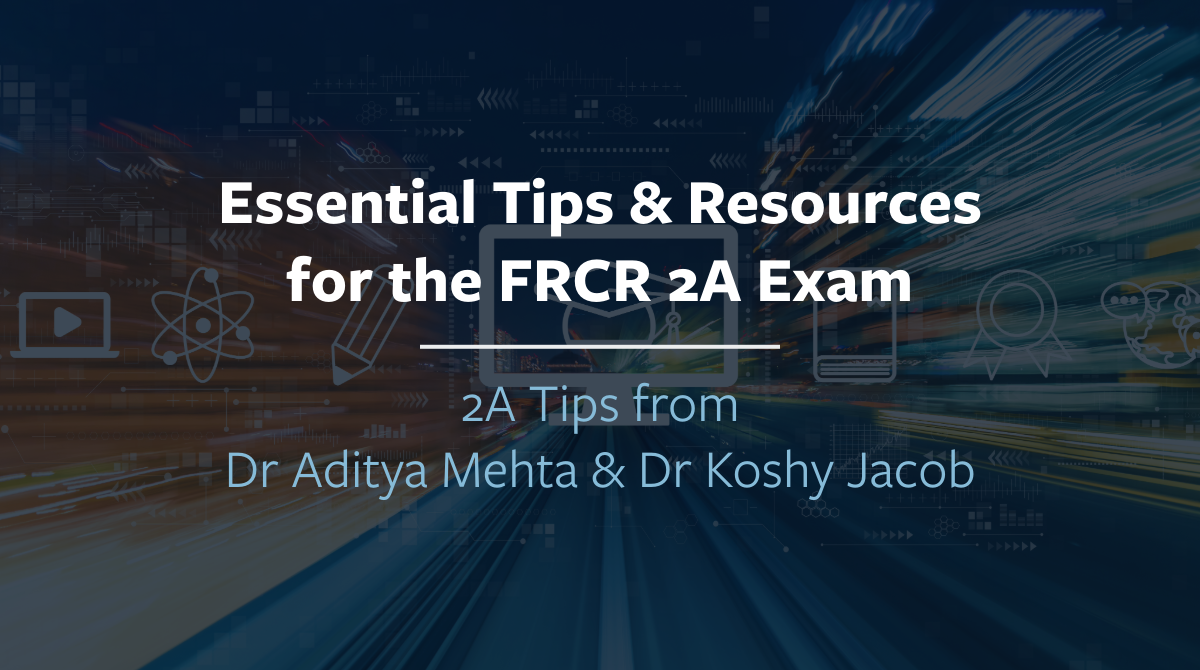
Essential Tips & Resources for the FRCR 2A Exam

Revise Radiology
September 3rd, 2024
Preparing for the FRCR 2A exam can be a daunting task, but with the right approach and resources, it’s entirely manageable. Dr Koshy Jacob and Dr Aditya Mehta recently shared their insights during a webinar, offering valuable tips on how to tackle this challenging examination. Here’s a summary of the key points they discussed, along with some recommended resources to help you succeed.
1. Preparing for the "What to Do Next" Questions
One of the common question types you'll encounter in the FRCR 2A exam is the "What to do next?" scenario. Dr Mehta suggests that candidates should not rely solely on textbooks, as they may not always provide the necessary guidance. Instead, consider using exam-specific resources like "Crack the Core" or Revise Radiology’s own study materials, which are designed to address these types of questions.
Dr Mehta emphasizes that the best approach is to think like a consultant or physician, considering what would be most beneficial for the patient and the healthcare system. Exam-specific books often include this practical advice under each topic, making them a crucial part of your study routine.
2. Maximizing Your Preparation in the Final Weeks
As the exam approaches, it's essential to focus on your weaknesses and high-yield topics. Dr Mehta recommends identifying areas where you've made the most mistakes and revising them thoroughly. Topics like nuclear medicine, imaging techniques, and commonly overlooked subjects can give you an edge over other candidates.
In the final weeks, prioritize revising these challenging areas and practice reducing errors in your answers. This focused revision strategy can help you boost your performance on exam day.
3. Approaching Safety and Management Questions
Questions related to safety and management are increasingly common in the FRCR 2A exam, particularly those involving scenarios like pregnant women with suspected pulmonary embolism. Dr Mehta advises candidates to familiarize themselves with guidelines from the Royal College of Radiologists (RCR) and NICE. These guidelines form the basis for many exam questions, so understanding them is crucial.
To prepare effectively, use online resources such as RCR and NICE guidelines, and integrate them into your study materials. For example, you can make notes in the margins of your "Crack the Core" or core radiology textbooks to revisit these guidelines during your final revision.
4. Strengthening Your Knowledge of Management Scenarios
Management questions require a deep understanding of the daily practices and decision-making processes in radiology. Dr Jacob suggests that daily practice is one of the best ways to learn about management, as it helps reinforce the knowledge you’ll need in the exam.
Additionally, resources like StatDx can provide valuable management insights. Dr Mehta also found Radiopaedia to be a useful tool, especially for understanding specific management guidelines, such as those related to gallbladder polyps.
5. Selecting the Right Study Materials
When it comes to choosing study materials, Dr Mehta highlights the importance of using multiple resources. While books like "Oxford Handbook of Radiology" are a good starting point, it's essential to understand that the exam questions can be drawn from various sources.
Revise Radiology’s question bank has been designed to cover a broad range of topics from different textbooks, making it a comprehensive resource. While it’s beneficial to use multiple study guides, having a go-to resource like Revise Radiology can streamline your preparation.
6. The Value of Practice and Real-World Application
Practical experience in radiology, such as reporting cases and understanding the implications of scans, is invaluable for FRCR 2A preparation. Dr Jacob points out that those who are actively reporting cases will have a stronger foundation in the exam. However, if you’re not currently in a reporting role, focus on MCQs and case studies to simulate the experience.
Understanding the clinical significance of findings and how they impact patient management is key to performing well. Dr Mehta advises asking yourself why each topic is important and how it relates to real-world scenarios. This approach not only helps in answering questions correctly but also in retaining the information.
Conclusion
The FRCR 2A exam is challenging, but with the right strategy and resources, you can navigate it successfully. Focus on practical, exam-specific materials, practice regularly, and ensure you understand the guidelines and management protocols. By doing so, you’ll be well-prepared to tackle any question that comes your way.
For a comprehensive preparation experience, consider using Revise Radiology’s resources, which are designed to cover all key topics and provide you with the tools you need to succeed. Good luck with your exam preparation!
Interested to see what Revise Radiology can do for you? Check out our Demo Subscription here.
Click here to see our FRCR 2A Resources.
